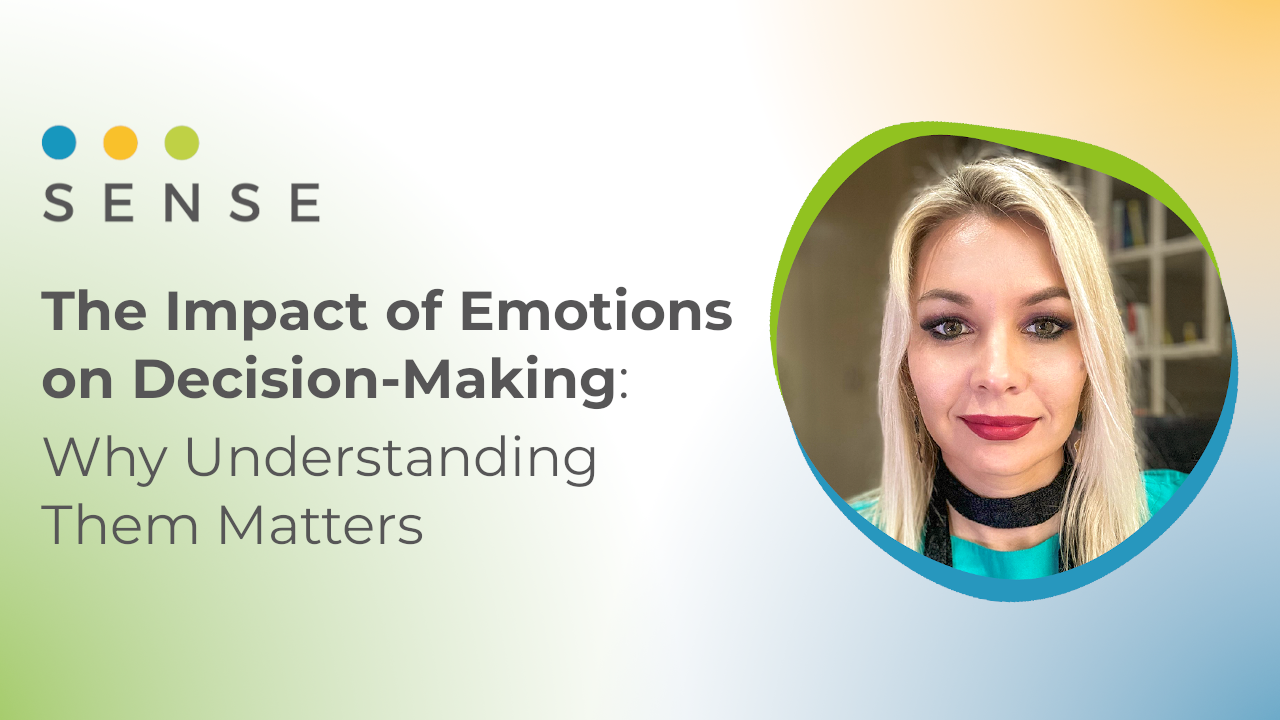The Impact of Emotions on Decision-Making: Why Understanding Them Matters
Jul 16
/
Sonica Mouton

Have you ever made a hasty decision in anger, or felt so overwhelmed by sadness that you chose inaction? There may have been times when you dwelled too much on a decision because of fear, or perhaps you acted impulsively due to excitement about a project.
Behind every decision lies a silent but powerful force—our emotions. They influence how we see things, guide our choices, and ultimately shape our future. Yet in the rush of daily life, their importance often goes unnoticed. So let’s shine a spotlight on this overlooked truth: Understanding our emotions isn't just important—it's crucial for making better decisions. As Neuroscientist Antonio Damasio said, "We are not thinking machines that feel, we are feeling machines that think."
Research has shown that our bodies are naturally set up to feel first and think later. Emotions provide key insights that can lead us to decisions that might not seem logical but are often protective and deeply rooted in our survival instincts.
Despite their complexities, emotions are not inherently bad. In fact, our emotional reactions often happen faster than our rational thought processes, allowing us to respond instinctively to what's around us. For example, the emotional centers in our brain can trigger responses in as little as 8 milliseconds—much faster than the cognitive processes that start after about 40 milliseconds. This quick reaction can be life-saving in emergencies, such as when you instinctively brake to avoid a car accident.
Daniel Goleman's idea of emotional intelligence suggests that understanding and managing our emotions can lead to more effective decision-making. Insights from experts like Daniel Kahneman, Susan David, and Brené Brown stress that in our complex world, being aware of and managing our emotions, and understanding how they affect our decisions, is not only important—it's essential.
At SENSE, we understand the power of emotions and their impact on decision-making. We use a tailored approach to help individuals understand and manage their emotions. By identifying the emotional factors that influence each person, we empower them to make well-informed and balanced decisions every day.
The SENSE method is not just about making better decisions, but also about becoming emotionally agile. It's about more than just surviving tough times; it's about thriving, adapting, and improving because of them.
To put these ideas into practice and further enhance your decision-making skills, here are a few actionable steps you can start today:
- Mindful reflection: Spend a few minutes each day reflecting on your emotional state. Identify what emotions you feel and think about their causes. This practice can help you understand your emotional triggers and patterns.
- Emotion journaling: Keep a journal where you log significant emotional reactions and the decisions they influenced. Over time, this record will help you see connections between your feelings and your actions.
- Pause and assess: Before making a decision, especially an important one, pause to evaluate your emotional state. Ask yourself if your emotions are clouding your judgment or if they are offering useful insights.
- Consult with others: Discussing your feelings with others can provide new perspectives and help reduce the intensity of your emotions, leading to clearer thinking.
Embracing these practices not only improves your decision-making abilities, but also contributes to your overall well-being. In his book "Master Your Emotions," Thibaut Meurisse highlights that understanding emotional triggers and responses enables individuals to make choices that not only feel right, but are also strategically wise.
So let’s commit to recognizing the significant impact of our emotions on our decisions. By embracing and understanding our emotional selves, we can enhance our decision-making abilities and ultimately, our overall well-being.
References:
- Damasio, A. R. (1999). The Feeling of What Happens: Body and Emotion in the Making of Consciousness. Houghton Mifflin Harcourt.
- Boyatzis, Richard, and A. McKee. "Neuroscience and leadership: The promise of insights." Ivey Business Journal 75.1 (2011): 1-3.
- Brown, B. (2021). Atlas of the Heart: Mapping Meaningful Connection and the Language of Human Experience. Random House.
- David, S. (2017). Emotional Agility: Get Unstuck, Embrace Change, and Thrive in Work and Life. Avery.
- Goleman, D. (1995). Emotional Intelligence: Why It Can Matter More Than IQ. Bantam Books.
- Kahneman, D. (2021). Noise: A Flaw in Human Judgment. Little, Brown and Company.
- Meurisse, T. (2019). Master Your Emotions: A Practical Guide to Overcome Negativity and Better Manage Your Feelings. CreateSpace Independent Publishing Platform.

